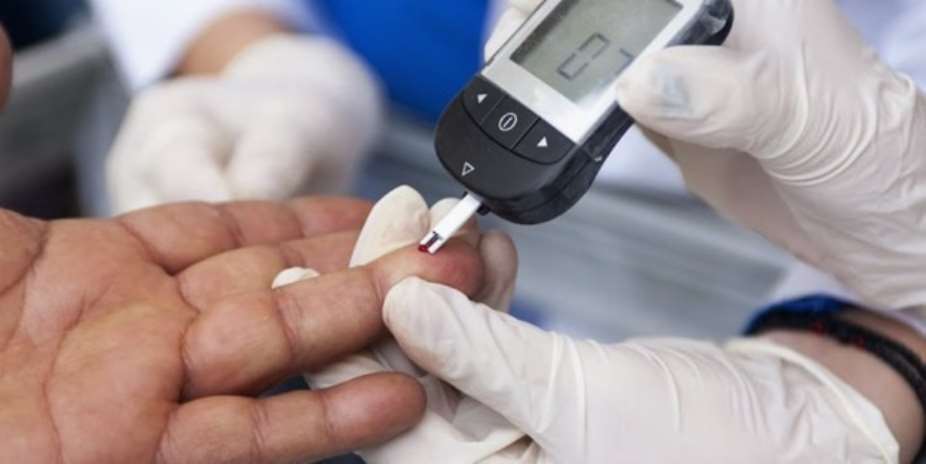Hi, this is Dr. Barbara Entsuah, Family Medicine Specialist. This month is designated DM Month.
Diabetes Mellitus (DM ) also known as “Sugar Diabetes” is a disorder affecting how the body moves sugar or glucose from the blood into the cells, to be used for energy and other cell processes. Insulin which is produced by an organ called the pancreas usually helps move glucose from the blood to the cells. Diabetes Mellitus type 2 which is mostly found in adults occurs when there is either a short supply of insulin or the cells are not responding to or are resisting Insulin. This causes chronic elevated Blood Sugar (BS) in the blood, while the cells are lacking it. Destruction of the pancreas can also cause DM. The Initial symptoms may include increased urination and water drinking, thirst, vaginal and groin yeast infections, Urinary tract infections and vision problems. Weight loss may also occur even if one is eating normal.
DM is diagnosed by doing Blood Tests. These may include Fasting Blood Sugar, (FBS), Hemoglobin A1c (A1c) or Blood Sugar checked 2 hours after a meal (PPG). People whose BS are elevated but not to DM levels may have Prediabetes.
Prevention of Diabetes or Prediabetes
DM or Prediabetes are prevented with Healthy lifestyle changes: Physical activity, healthy diet, and weight loss. Diet should be high in fruits and veggies and low in carbohydrates. Medication is sometimes used in Prediabetes to prevent development of Type 2 Diabetes. Obese kids can also develop Type2 DM.
Complication of Diabetes
Diabetes especially if uncontrolled can result in complications affecting many organs or systems.
1.Eye Problems: The vessels behind the eye are affected leading to decreased vision or blindness
2. Kidney Problems: High BS can result in damage to the Kidney’s blood flow resulting in chronic kidney disease which can progress to kidney failure and need for Dialysis
3. Nerve Problems: These include numbness, tingling decreased sensation of extremities and problems with BP, pulse, digestive system, sexual function, and bladder problems.
4. Leg Amputation: DM is the leading cause of amputation of limbs: and toes due to nerve damage or circulation problems
5. Heart Attacks and Strokes; About 60% or more of people with DM may die of either one of these diseases. Women with DM have 2-3x the risk of getting coronary heart disease (e.g., Heart Attacks) compared with women without DM.
6. Circulation Problems: Decreased blood flow to the legs and neck result in Peripheral Vascular Diseases resulting in pain in the legs with walking, amputations and Mini Strokes and Strokes in the brain.
Treatment of Diabetes:
DM is not a death sentence. Most people are treated with oral medications, however Insulin is sometimes required, although other non-insulin injectables are now available. Some may even help one lose weight, prevent heart and vascular disease, and Improve kidney function. It is important to be involved in the management of your disease by
Change lifestyle by eating healthy, exercising, and losing weight
Check your Blood Sugar as ordered by your doctor
See your doctor regularly and do your Blood Work as ordered
Make sure A1c (A), Blood Pressure (B), and Cholesterol (C) are controlled
Inspect your feet every night to make sure you do not have a cut or sore.
Take your medicines as prescribed
TAKE CHARGE OF YOUR HEALTH- IT IS IN YOUR HANDS
Dr. Barbara Entsuah MD. MHSc. Family Medicine
Latest Book: “A woman’s Guide to her body and her total Health”
#Loveyourbody#.
.





 Former Kotoko Player George Asare elected SRC President at PUG Law Faculty
Former Kotoko Player George Asare elected SRC President at PUG Law Faculty
 2024 elections: Consider ‘dumsor’ when casting your votes; NPP deserves less — P...
2024 elections: Consider ‘dumsor’ when casting your votes; NPP deserves less — P...
 You have no grounds to call Mahama incompetent; you’ve failed — Prof. Marfo blas...
You have no grounds to call Mahama incompetent; you’ve failed — Prof. Marfo blas...
 2024 elections: NPP creates better policies for people like us; we’ll vote for B...
2024 elections: NPP creates better policies for people like us; we’ll vote for B...
 Don’t exchange your life for wealth; a sparkle of fire can be your end — Gender ...
Don’t exchange your life for wealth; a sparkle of fire can be your end — Gender ...
 Ghana’s newly installed Poland train reportedly involved in accident while on a ...
Ghana’s newly installed Poland train reportedly involved in accident while on a ...
 Chieftaincy disputes: Government imposes 4pm to 7am curfew on Sampa township
Chieftaincy disputes: Government imposes 4pm to 7am curfew on Sampa township
 Franklin Cudjoe fumes at unaccountable wasteful executive living large at the ex...
Franklin Cudjoe fumes at unaccountable wasteful executive living large at the ex...
 I'll 'stoop too low' for votes; I'm never moved by your propaganda — Oquaye Jnr ...
I'll 'stoop too low' for votes; I'm never moved by your propaganda — Oquaye Jnr ...
 Kumasi Thermal Plant commissioning: I pray God opens the eyes of leaders who don...
Kumasi Thermal Plant commissioning: I pray God opens the eyes of leaders who don...
